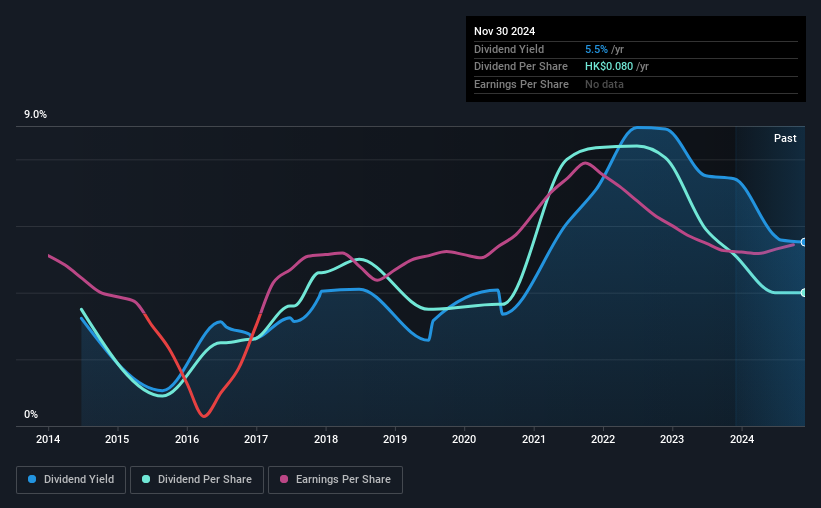Chen Hsong Holdings Limited (HKG:57) will pay a dividend of HK$0.038 on the 14th of January. This will take the annual payment to 5.5% of the stock price, which is above what most companies in the industry pay.
Check out our latest analysis for Chen Hsong Holdings
Chen Hsong Holdings' Future Dividend Projections Appear Well Covered By Earnings
A big dividend yield for a few years doesn't mean much if it can't be sustained. Prior to this announcement, Chen Hsong Holdings' dividend was comfortably covered by both cash flow and earnings. This indicates that quite a large proportion of earnings is being invested back into the business.
Looking forward, earnings per share could rise by 2.1% over the next year if the trend from the last few years continues. If the dividend continues on this path, the payout ratio could be 53% by next year, which we think can be pretty sustainable going forward.

Dividend Volatility
The company has a long dividend track record, but it doesn't look great with cuts in the past. The annual payment during the last 10 years was HK$0.07 in 2014, and the most recent fiscal year payment was HK$0.08. This implies that the company grew its distributions at a yearly rate of about 1.3% over that duration. It's encouraging to see some dividend growth, but the dividend has been cut at least once, and the size of the cut would eliminate most of the growth anyway, which makes this less attractive as an income investment.
Chen Hsong Holdings May Find It Hard To Grow The Dividend
With a relatively unstable dividend, it's even more important to evaluate if earnings per share is growing, which could point to a growing dividend in the future. However, Chen Hsong Holdings has only grown its earnings per share at 2.1% per annum over the past five years. Growth of 2.1% per annum is not particularly high, which might explain why the company is paying out a higher proportion of earnings. This isn't bad in itself, but unless earnings growth pick up we wouldn't expect dividends to grow either.
Our Thoughts On Chen Hsong Holdings' Dividend
Overall, it's great to see the dividend being raised and that it is still in a sustainable range. While the payout ratios are a good sign, we are less enthusiastic about the company's dividend record. The dividend looks okay, but there have been some issues in the past, so we would be a little bit cautious.
Market movements attest to how highly valued a consistent dividend policy is compared to one which is more unpredictable. However, there are other things to consider for investors when analysing stock performance. Just as an example, we've come across 2 warning signs for Chen Hsong Holdings you should be aware of, and 1 of them makes us a bit uncomfortable. Looking for more high-yielding dividend ideas? Try our collection of strong dividend payers.
New: AI Stock Screener & Alerts
Our new AI Stock Screener scans the market every day to uncover opportunities.
• Dividend Powerhouses (3%+ Yield)
• Undervalued Small Caps with Insider Buying
• High growth Tech and AI Companies
Or build your own from over 50 metrics.
Have feedback on this article? Concerned about the content? Get in touch with us directly. Alternatively, email editorial-team (at) simplywallst.com.
This article by Simply Wall St is general in nature. We provide commentary based on historical data and analyst forecasts only using an unbiased methodology and our articles are not intended to be financial advice. It does not constitute a recommendation to buy or sell any stock, and does not take account of your objectives, or your financial situation. We aim to bring you long-term focused analysis driven by fundamental data. Note that our analysis may not factor in the latest price-sensitive company announcements or qualitative material. Simply Wall St has no position in any stocks mentioned.
About SEHK:57
Chen Hsong Holdings
An investment holding company, engages in the manufacture and sale of plastic injection molding machines and related products in Mainland China, Hong Kong, Taiwan, and internationally.
Flawless balance sheet with proven track record and pays a dividend.
Similar Companies
Market Insights
Community Narratives



